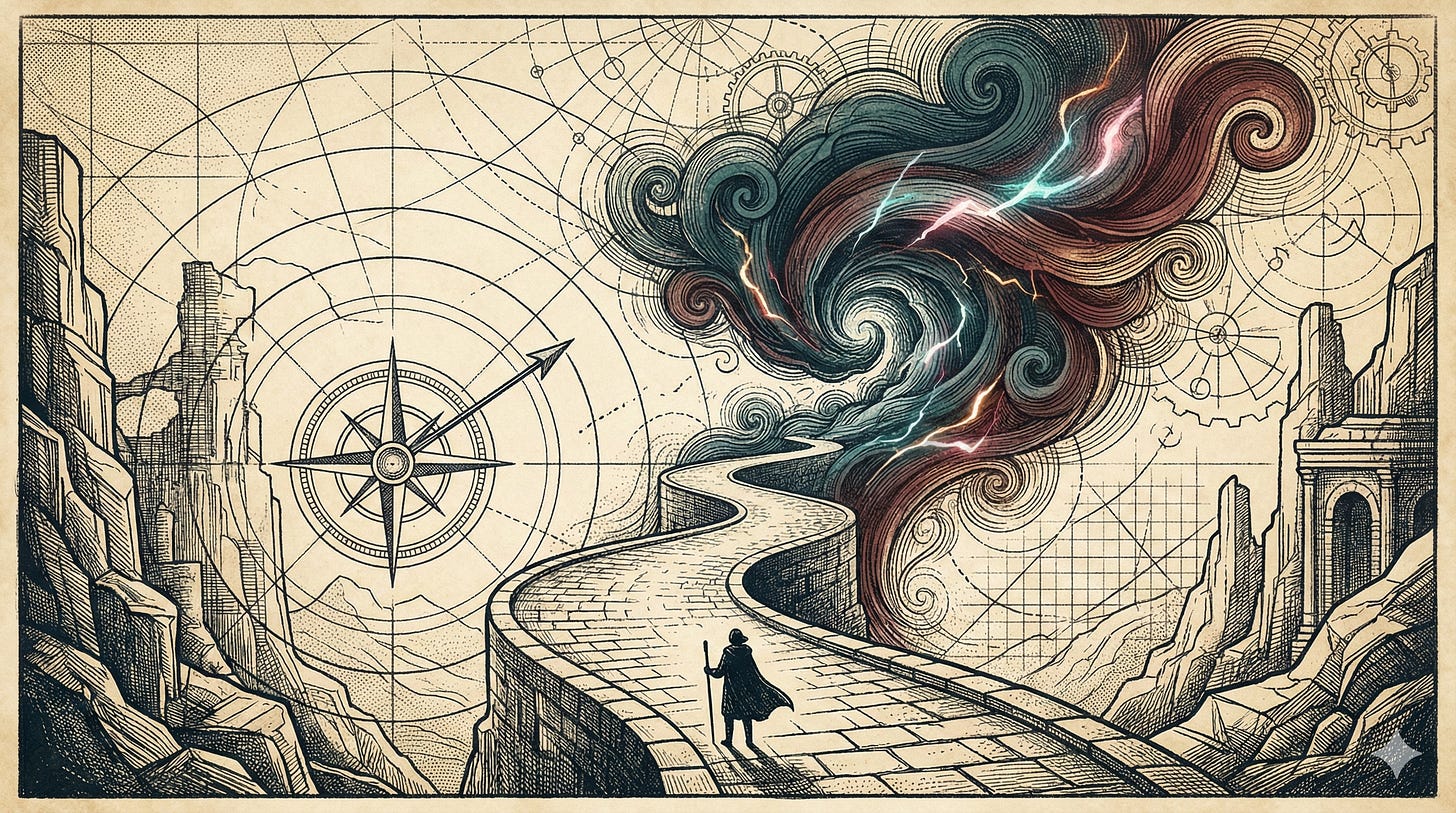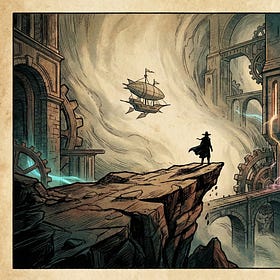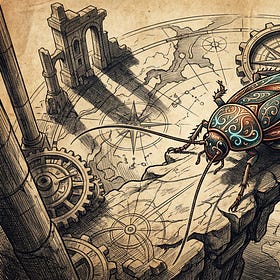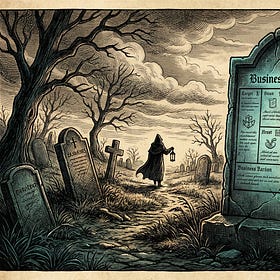How to Cope with Uncertainty About the Future
Stop worrying about strategy. Start developing your options. Don't make a plan; make a platform.
Stop crafting strategic plans for scenarios that will never materialize.
I stopped making business plans and started building optionality instead. Here's why coping with uncertainty means growing your platform, not your PowerPoints.
My accountant inquired about my business plans and revenue forecasts for the next three years. They “needed” this to create the annual reports.
Are you kidding?” I replied. “I don’t even know what I’ll be doing next month!”
Why Strategic Planning Fails in Uncertain Times
Strategic planning is the business world’s favorite fortune-telling exercise. But relentless strategizers and forecasters are often as confident as they are mistaken. Strategy is a dangerous trap for any freelancer, entrepreneur, and multidisciplinary professional. I speak from personal experience here. I could build a replica of the Kremlin out of failed business model canvases.
While the fortunetellers among us are busy crafting color-coded strategic maps for scenarios that will never materialize, their smarter peers are sharpening their current networks, growing their reputations, and expanding their platforms. Every hour professionals spend agonizing over next year’s strategy is an hour not spent building today’s advantages: better data, stronger relationships, deeper expertise, and sharper instincts.
Strategic planning is mostly theater.
I’m not worshipping strategic chaos or nihilism here. I just recognize that in our current volatile business landscape, the obsession with prediction and forecasts reveals a fundamental mismatch with how the future usually plays out. Markets don’t follow our roadmaps in PowerPoints. Opportunities never arrive on schedule. And black swans never text us their ETAs.
“Life is about not knowing, having to change, taking the moment and making the best of it, without knowing what’s going to happen next.” — Gilda Radner, comedian
The best way to cope with uncertainty about the future is not about predicting what will happen next. Strategy is building and positioning your platform to capitalize on whatever happens tomorrow. We must stop obsessing over next year’s plans and start developing today’s options.
How I Cope with Uncertainty
I learned this lesson the brutal way.
For years, I’d been the guy with the grand visions, ambitious business plans, and meticulously crafted maps and canvases. I looked like someone who had it all figured out. In reality, it appears I was just skilled at fantasizing elaborate theories about a business landscape that kept shifting beneath my feet as I frantically tried to chart my course. I was a maverick mapmaker traveling a sea of landslides.
Not anymore. Forecasting my business is like predicting the final ranking of next year’s Eurovision Song Contest without even knowing which countries are going to participate. I abandoned that approach.
I stopped pretending I could predict the future and instead started building the capacity to cope with uncertainty about the future. Instead of betting on carefully crafted pitch decks and value propositions, I started cultivating a portfolio of possibilities and growing a platform of options.
For example, I now spend considerable time developing and refining what I call my Human Attention System—collecting, organizing, and nurturing all my contacts across Substack, LinkedIn, Gmail, Google Calendar, X/Twitter, and half a dozen other platforms. It might sound mundane, even boring. But in terms of creating options, it’s like spinning gold:
No AI workflows or agents will function without good data. It’s garbage in, garbage out. Instead of worrying about specific value streams I might develop someday, it’s smarter to grow a system with healthy data that will turbo-charge any value stream I discover and develop in the future.
Data, network, reputation, and infrastructure create moats around your business in ways that algorithms can’t. Processes can be easily copied, reverse-engineered, or spat out by the latest version of Claude. But nobody can replicate the four moats and the thousands of relationships I am nurturing. Nobody can duplicate my platform.
While automation creates abundance, what becomes scarce and precious is human attention. No matter which direction your business evolves, what’s increasingly valuable is having the attention of the people you know. They cannot engage with you and doom-scroll through TikTok at the same time.
The possession of excellent data can actually create business opportunities you weren’t even seeking. Intelligence begets innovation in ways we cannot even imagine today. If you’re not actively listening for signals in the noise, you’ll never have that business idea that could lift you from the swamp next year.
That’s why I stopped worrying about the future and why I’m not developing any business strategies for a while. It feels like squandered time. Instead, I spend hours improving my data, growing my network, nurturing attention, and listening for signals. This is how I increase optionality.
The Science of Optionality: Building Resilience Through Options
Complexity researchers and systems thinkers have understood optionality for decades. Increasing optionality is a strategic approach that helps both individuals and organizations cope with uncertainty by expanding the range of choices and pathways in changing or unpredictable environments.
From a systems thinking perspective, organizations are interconnected parts within larger systems. In uncertain environments, rigid plans often collapse. Having multiple options means building redundancy—if one path fails, others remain available. It creates resilience, allowing the system to adapt to disruptions because alternatives exist. And it establishes positive feedback loops where experimentation and learning from many options drive anti-fragility.
Complexity science studies (among other things) how small changes can have massive impacts in unpredictable, nonlinear systems. Optionality works by exploring the solution space—more options mean more chances to discover beneficial actions when dynamics shift. It helps avoid path dependency, preventing you from getting locked into a single approach when you need to pivot. And it enables emergence, where new solutions may appear that could not have been predicted in advance.
The financial math is unforgiving as well: every hour spent perfecting plans for scenarios that won’t materialize is an hour not spent developing real options for undiscovered scenarios that will. It’s opportunity cost in its purest form—trading actual adaptability for the comforting illusion of certainty.
That’s enough systems jargon for now, I think.
To put it more simply: rather than agonizing over future success, spend time growing your platform. Whatever value you choose to create next year, the platform you build now will enable and accelerate it.
Why Optionality Matters in the Age of AI
Planning is the last refuge of control freaks in an otherwise uncontrollable world.
While everyone’s busy crafting strategies and roadmaps, reality keeps rewriting the rules faster than we can read them. Entrepreneurs clutching their strategic plans look suspiciously like generals armed with assumptions about a battlefield that is unlike anything they’ve ever experienced. They charge into enemy territory with a plan promising swift victory, but four years later they’re still frantically defending the first twenty kilometers they captured. (Sound familiar?)
When disruption hits—and it always does, doesn’t it?—the winners aren’t the ones who saw it coming or planned for it. They’re the ones who had the people, relationships, and resilience to surf the uncertainty and exploit the opportunity, while their competitors were updating their forecasts somewhere underwater.
I’m not advocating abandoning all structure. I simply recognize that in a world where the map changes faster than we can redraw it, your skills using a compass matter more than cartography. Our goal isn’t about giving up. It about giving in. It’s about developing an antifragile platform that gets stronger every time our assumptions shatter.
The future belongs to those who build capability, not those who build scenarios. So let’s stop trying to map the unknowable future. (Yes, I know. This sounds rather ironic coming from someone who calls himself The Maverick Mapmaker.) Instead, we should make ourselves unmappable to everyone else—more connected, better informed, and less predictable.
When everything changes, we don’t want to be the player with the best cards for a game that no longer exists. We want to be the ones who learned how to excel in any game that lands on the table.
Now, when someone asks me about my plans, I say, “My plan is to be in optimal shape for whatever gets thrown in my path.”
The Practice of Uncertainty: Platform Over Planning
True strategic thinking isn’t about trying to forecast the answers. It’s about staying fluid enough to ask better questions when the world inevitably zigs while everyone’s plans are busy zagging. Coping with uncertainty about the future means creating a launchpad, not a crystal ball. Developing options, not certainties.
For me, this means returning each day to the unglamorous work of cleaning data, automating my network, building relationships, and developing capabilities. I’m not anxiously plotting scenarios. I’m steadily growing my Human Attention System and we’ll see what unplanned fortunes it brings me. I’m tired of being the guy holding a beautifully crafted map leading absolutely nowhere.
I’m done with the pitches and PowerPoints.
“We can’t be afraid of change. You may feel very secure in the pond that you are in, but if you never venture out of it, you will never know that there is such a thing as an ocean, a sea.” — C. JoyBell C., author
Never before have we faced such uncertainty.
I'm a seasoned founder, intrapreneur, and former CIO who builds maps and models for Solo Chiefs navigating sole accountability in the age of AI—informed by plenty of scar tissue. All posts are free, always. Paying supporters keep it that way (and get a full-color PDF of Human Robot Agent plus other monthly extras as a thank-you)—for just one café latte per month.
I see it every day in my news feeds and social media threads. I discuss it often with friends, family, and freelancers who find themselves in more challenging situations than I face. Everyone wants to know how to deal with an uncertain future. The answer is not yet another business model canvas with strategic scenarios. For most of us, our future is not an AI-generated pitch deck with AI-generated forecasts.
Our future is a human-developed platform with a dizzying range of options.
Stop planning. Start building.
Jurgen, Solo Chief
P.S. What's the most useless strategic plan you ever created? I need to feel less alone.
Confessions of a Fearless Founder—From Crazy Bets to Safe Bets
The Best Founders Aren't Risk-Takers. They're Risk-Avoiders.
The Business Model Canvas Graveyard
Artificial intelligence is delivering the killing blow to an already oversaturated market of knockoffs and copycats.






Love it. I call it „increasing my surface for serendipity“.
Sounds like a compelling strategic plan, Jurgen! 😉